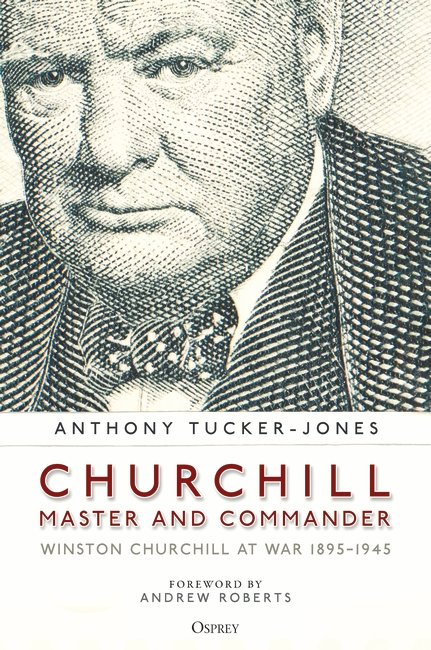
With the release of Churchill Master and Commander in paperback, acclaimed historian Anthony Tucker-Jones offers a glimpse of what readers can expect.
Foremost, I would like to say you can expect a good read! I am often asked what inspired me to write about Winston Churchill. Well, in a past career I worked in the historic Old War Office Building (OWOB) in Whitehall, London, and found myself surrounded by his echo. He had also worked in the OWOB during the First World War as Minister of Munitions and subsequently as Secretary of State for War. My office was a stone’s throw from the Old Admiralty Building where he twice worked as the First Lord of the Admiralty. Just down Whitehall is 10 Downing Street where he served two terms as Prime Minister. Not far from there are the Cabinet War rooms which acted as his nerve centre during the war. On from there are the Houses of Parliament where he was a Member of Parliament, and opposite Westminster Palace in Parliament Square is his statue. Also, during my time at the OWOB I met Nicholas Soames, one of Churchill’s grandsons, when he was Minister of State for the Armed Forces.
Churchill featured regularly in many of my books, but was never the focus. In writing ‘Churchill Master and Commander’ my aim was to examine why Churchill felt he was so qualified to act as both political master and military commander in 1940. As a young man his strategic outlook was forged on the battlefields of Cuba, India, Sudan and South Africa. All of this prepared him for senior government roles as Home Secretary, Colonial Secretary, First Lord of the Admiralty, Minister of Munitions, Secretary of State for War and Air and, finally, combined Prime Minister and Defence Minister.
I am fascinated by his early escapades, which mark him out as an adrenalin junky. His numerous scrapes with death convinced him he was invincible and that nothing in life is gained without taking risks. Memorably, he survived being under fire on the North-West Frontier. He escaped death in the Sudan at the Battle of Omdurman – having gotten lost on the way there. His numerous brushes with death during the Boer War are legendary: he survived a train crash and was almost shot in the head at Spion Kop, whilst at Hussar Hill he miraculously went unscathed while his brother was wounded, and at Dewetsdorp he lost his horse and was almost ridden down.
On the Western Front during the First World War he never ducked when coming under fire. He was almost killed by friendly fire and on another occasion nearly lost his righthand. During the Second World War, on the way back from France, he narrowly escaped being shot down by the Luftwaffe. In Normandy he put himself at risk by visiting General Montgomery. South African Prime Minister General Smuts, who was travelling with him, claimed he could smell ‘Boche’ and a German soldier was dragged from nearby bush. Churchill came under shell and sniper fire whilst recklessly climbing on a wrecked bridge over the Rhine at the end of the war.
In the book, I highlight Churchill’s controversial enthusiasm for mustard gas over the years! I explain how he defied Lloyd George by trying to escalate British intervention in the Russian Civil War. He resorted to using Czech mercenaries to prop up the White commander, General Kolchuk. I recount why he implemented Air Marshal Trenchard’s controversial Air Control in Iraq, in part to save the RAF. His strategic judgement was not always sound; during the 1930s he favoured the Japanese over the Chinese and showed little interest in the Spanish Civil War. In contrast, he had access to good intelligence on the rise of the Nazis, due to his early support for MI5 and MI6.
Despite being aware of the Japanese threat to the Far East, Churchill knew he could not save both Cairo and Singapore – the loss of Singapore triggered the widespread Quit India revolt in 1942, which impacted on the fighting in Burma. Field Marshal Wavell was critical of Churchill’s handling of the Bengal famine – yet he wanted all local boats impounded or sunk to stop them falling into enemy hands and knew of the threat posed by the Japanese Navy in the Bay of Bengal. Churchill’s adherence to his Mediterranean first strategy brought him to loggerheads with the Americans and the Russians. He threatened to resign over the landings on the French Riviera in 1944 because it weakened the campaign in Italy. He then made a unilateral intervention in Greece without President Roosevelt’s approval. Few people are aware that Churchill almost invaded neutral Ireland twice, in 1940 and again in 1942.
Despite his flaws and mistakes, he triumphed in being a successful master and commander. General Spears remarked that Churchill made himself ‘the High Priest of a great religion dedicating a nation to measureless sacrifice.’ General Eisenhower observed, ‘During the war Mr Churchill maintained such close contact with operations as to make himself a virtual member of the British Chiefs of Staff.’ Anthony Eden observed, ‘The machinery for the military and political conduct of the war had been discerningly built and it worked.’ Nor was Churchill adverse to self-aggrandisement, concluding, ‘History will be kind to me for I intend to write it.’ And write it he did!
If you enjoyed today's blog post you can find out more about the book here.

Comments
You must be logged in to comment on this post. Click here to log in.
Submit your comment